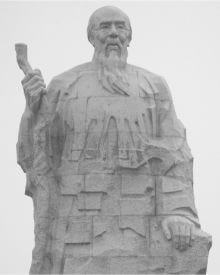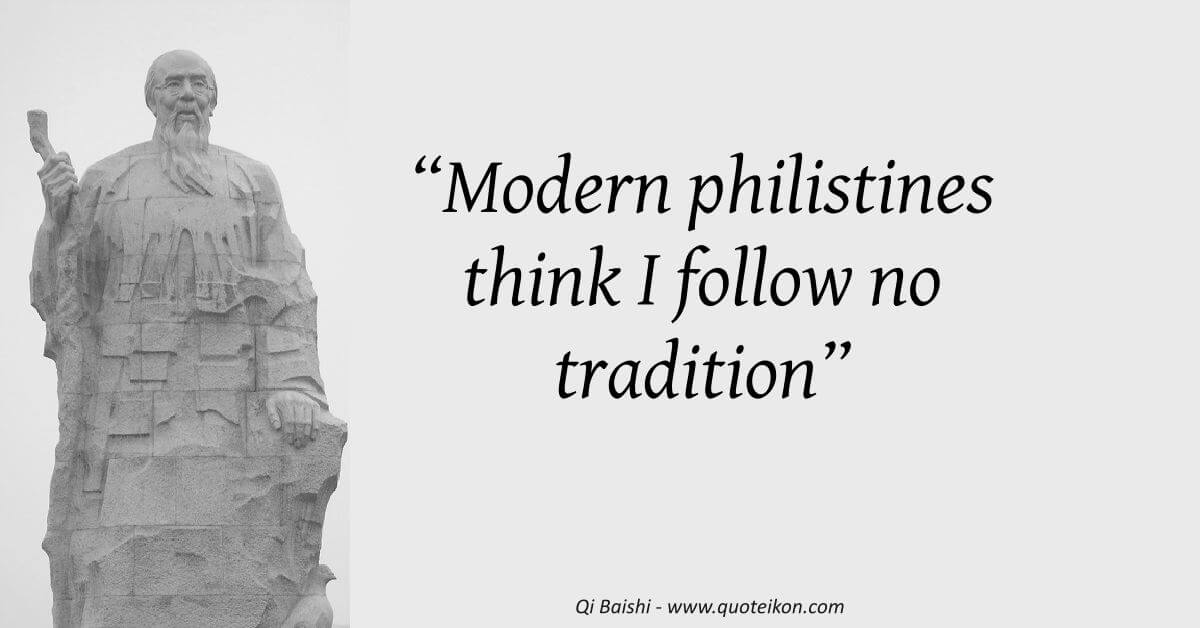
- Mini Bio
- Name: Baishi Qi
- Born: 1st January 1864, Xiangtan, Hunan, China
- Died: 16th September 1957, Beijing, China
- Occupation: Artist, painter and poet
- Style: Calligraphy and brush painting
- Influenced by: Zhu Da, Wu Changshi and Bada Sharen
- Also known as: The rich man of three hundred stone seals
- Officialdom: He was elected president of the China Artists Association
- Books: He was an accomplished poet who penned more than 3,000 poems and wrote two poetry books
"When I cut seals I do not abide by the old rules"
Qi Baishi"I pity this generation’s stupidity, for they do not seem to realize that the Chin and Han artists were human and so are we"
Qi Baishi"I suppose future generations will admire our present artists just as much as we admire these men of old. What a pity that I will not be there to see it"
Qi Baishi"Such classical artists as Ching-teng, Hsueh-ko and Ta-ti-tzu dared to make bold strokes in their paintings, for which I admire them tremendously"
Qi Baishi"Vulgar people often describe their seal engraving as something derived from Qin and Han seals. In fact, they have not learned anything"
Qi Baishi"When young I made a careful study of the calligraphy of the ancients, then looked for the inner logic of engraving characters"
Qi Baishi"We may have our unique qualities too which the men of old would admire too if they could see them"
Qi Baishi"Paintings must be something between likeness and unlikeness, much like today's vulgarians"
Qi Baishi"My one regret is that I was not born three hundred years ago"
Qi Baishi"Modern philistines think I follow no tradition"
Qi Baishi
Great quotes are not where you find great wisdom. It's where you share this knowledge that counts
Sharing Is Caring
Qi Baishi Biography
Qi Baishi was born into a poor agricultural family in Hunan province in 1864 and growing up he knew he wanted to be an artist and felt that farming was not suited to him so he secured work as an apprentice carpenter to fund his lifestyle as a part time artist.
Little did he know that he was to become the most prominent Chinese artist of the 20th century whose work would posthumously propel him into the $100 million U.S. dollar club. He became the first Chinese artist to join this illustrious club when his Twelve Landscape Screens (1925) sold for $141 million at Poly Auctions in Beijing in 2017
He joins a who's who of the greats from the world of art whose paintings have exceeded $100 million including; Andy Warhol, Claude Monet, Francis Bacon, Gustav Klimt, Pablo Picasso, Paul Gauguin, Peter Paul Rubens, Rembrandt and Vincent Van Gogh.
His 1946 painting Eagles On Pine Tree sold for $65 million in 2011 however the buyer had doubts about the paintings authenticity so reneged on his offer.
Throughout his life it is estimated that he created in excess of 10,000 distinct works of art yet Chinese auction houses have been inundated with works attributed to Baishi with over 18,000 attempted sales thus highlighting the forgery market in top end Chinese art.
Qi has 3,000 works of art housed in museums and art galleries around the world making him the most internationally recognised Chinese artist of the 20th century.
He avoided being sucked into China's political upheavals of the first half of the 20th century which was a smart move that aided his longevity at the easel
Although magic flowed from his brush to the canvas he was also an accomplished poet who consistently captured the human side of Chinese culture in both art forms. Away from the easel he was quick witted and good for a one liner so here is my compilation of 10 of the best Qi Baishi quotes
Quotes About Qi Baishi
Chairman Mao Zedong wrote a letter of artistic appreciation to Qi Bashi: "I thank you heartily for the gift of your scroll painting Pu tian tong qing (Joyous Celebration for All in Heaven), which I have received. I would like to express my gratitude to all your co-creators [of the masterpiece]: Messrs. Xu Shixue, Yu Feian, Wang Shensheng, Hu Peiheng, Pu Yizai, Pu Xuezai and Guan Songfang"
The head of the Hunan Provincial Museum's art department Liu Gang was impressed to say: "With a stroke of his brush, Qi Baishi was able to transform ordinary objects into art forms. Qi's paintings make you feel a sense of familiarity, while also serving as a source of artistic inspiration"
Anne Shih, chairwoman of the board at Bowers Museum used the terminology of Qi Baishi to describe his modern audience: "His paintings are enjoyed by the vulgar and admired by the refined as well"

